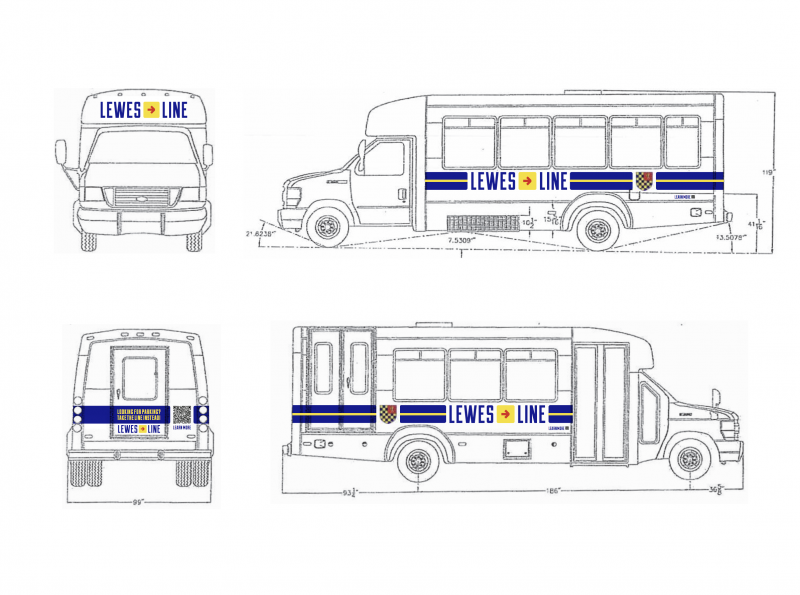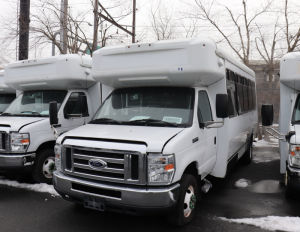Lewes is considering rolling out a transit service this summer.
Called the Lewes Line, the city service would lease five buses from Delaware Transit Corporation to run on a loop with nine stops around town. DTC is offering to lease each retired DART First State bus for $1.
A shuttle or jitney has been discussed at council budget meetings many times over the last decade, but the barrier has always been the cost to purchase or lease vehicles.
“This gives us an opportunity to offer the service for a season, see what works and what doesn’t work, and build on it,” said City Manager Ann Marie Townshend at the city’s first fiscal year 2023 budget meeting Feb. 4. “This is not starting off with a half-million dollars in bus purchases without even trying it.”
Townshend has been working on the proposal with Councilwoman Carolyn Jones, Councilman Khalil Saliba and Assistant City Manager Ellen Lorraine McCabe since November. They have met with transit planners at Delaware Transit Corporation several times, visited Bethany Beach to learn about its system and consulted with the City of Newark, which has successfully run a transit service for more than 30 years. Newark is also planning to lease DART buses.
The estimated cost of the pilot program is $157,000, which will pay for eight drivers, uniforms, vehicle maintenance, vehicle prep, insurance and fuel.
“When I was running for office, I said we’re never going to have enough parking spaces, and we have to figure out how to move people around,” Jones said. “I think we’ve come to that point. We have come up with what we think is a very good transit program.”
The plan is to run two buses on a prescribed route daily from 9 a.m. to 8 p.m., from the week before Memorial Day though Sept. 30. The current proposal has nine stops: Cape May-Lewes Ferry terminal, Johnnie Walker Beach (Beach 2), Savannah Beach (Beach 1), Otis Smith Park on Savannah Road, 1812 Park lot on Front Street, Canalfront Park, Schley Avenue parking lot, Lewes library/trailhead, and Cape Henlopen High School.
Saliba said people coming into Lewes who wish to use the Lewes Line would be encouraged to park at the high school or at the ferry terminal parking lot.
Mayor Ted Becker suggested the hours be extended to 9 p.m. to allow for people dining downtown to use the service without worrying about missing the last loop.
Buses have 14 seats, including two handicap spaces. Users would be charged $1 per day, cash only. The city estimates $20,000 in revenue.
“This is not a moneymaking thing; its purpose is to alleviate parking and get rid of some traffic congestion,” Jones said.
The buses being offered for lease have been retired by Delaware Transit Corporation.
“The state has a very rigorous maintenance program, so they have been well maintained,” Townshend said.
The only maintenance required before the city can use them is re-wrapping/lettering the buses to reflect the Lewes Line name.
If approved, the city will monitor the program throughout the first summer to determine what adjustments need to be made, or if the city wants to discontinue the program.
Mayor and city council will vote on the bus leases and whether to move forward with the transit service at its Monday, Feb. 14 meeting.
Other budget talks
The city is considering bumping its minimum pay for all employees to $16 per hour.
Townshend said the increase is needed to help with recruiting, specifically for seasonal employees such as lifeguards and maintenance workers.
“The state beaches are paying the lifeguards more than any of the towns, so we are seeing all of the towns increase their seasonal wages,” Townshend said. “I don’t know that everyone is at $16, but everyone has had to come up, because our competition is higher.”
McCabe noted that the City of Rehoboth Beach recently committed to paying employees at least $16 per hour.
A discussion to be held in later budget meetings is if mayor and city council is willing to expand the guarded beach area. Currently, lifeguards cover only Savannah Beach and Johnnie Walker Beach, formerly known as Beaches 1 and 2.
The FY 2023 budget calls for an additional officer in the parking enforcement department, bringing the staff up to eight officers and a supervisor. An additional employee will provide flexibility, allowing one person to stay in the office to field questions while also having a full contingent on the street, Townshend said.
Currently not budgeted is implementation of a beach parking permit program.
The first draft of the budget was presented as balanced, with $9.5 million in revenues and expenses. The budget includes $1.77 million in funds from the American Rescue Plan Act. While all of those funds are not expected to be used in fiscal year 2023, Townshend said staff added the funds to both revenues and expenses to reflect the availability of that federal money. Becker noted that ARPA funds must be allocated by 2024 and spent by 2026. Right now, the money is use it or lose it, but Congress could change those deadlines in the future.
The first draft uses $780,000 in prior-year reserves to balance the budget. Townshend said she’d like council to chip away at that number.
“Transferring from our prior-year reserves for operations is not a sustainable budgeting strategy,” she said.
Larger projects in the budget include improvements to Railroad Avenue ($615,000), beach parking lot lighting ($400,000), Canalfront Park improvements ($490,000), implementation of wayfinding signage ($107,500), police department renovations ($99,500) and city dock improvements ($60,000).
Not funded in the current draft of the budget are body cameras for the police and several staffing positions such as an entry-level planner, IT professional, and staff tasked with communications and finance.
Townshend said there are several ways to increase revenues. The city has not increased property taxes since 2011, when the rate was raised 8 cents. A 1-cent increase equals $47,500 in additional revenue, resulting in an average tax bill increase of $14, she said.
The city could also consider increasing parking meter fees. They were last increased in 2014 in downtown and 2017 at the beach. A quarter increase equals $90,000 in additional revenue, Townshend said.
Another option, she said, is to change how building permit fees are determined. She said the city could move to a fee based on construction costs instead of its current method of charging based on square footage.
Cutting expenses is also a way to balance a budget. Deputy Mayor Andrew Williams suggested the city consider putting out a request for proposals for engineering and legal services. Legal services are budgeted at $600,000 for FY 2023, while engineering services are at $150,000.
“For these [services] that represent such large line items, it’s responsible this time of year to see what we’re getting and what else might be out there for us,” he said.
For engineering services, Townshend said, it makes most sense to use the same firm as the Lewes Board of Public Works, since many projects overlap. At this time, Becker said, the BPW has no interest in changing engineering firms.
“We’ve been through split engineering services in the past, and it turned out to be very expensive,” Becker said.
Mayor and city council are expected to discuss the issue further at the Monday, Feb. 14 regular meeting.
Beginning Friday, Feb. 11, all budget meetings will be held in person at city hall and via Zoom. There will be limited seating in council chambers, and those attending are required to wear masks. A link to view the meeting via Zoom can be found on the agenda at lewes.civicweb.net.


















































